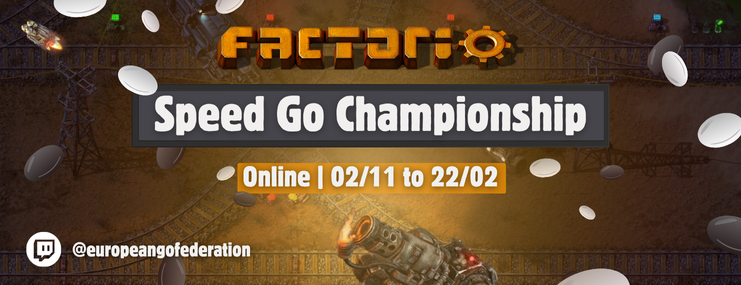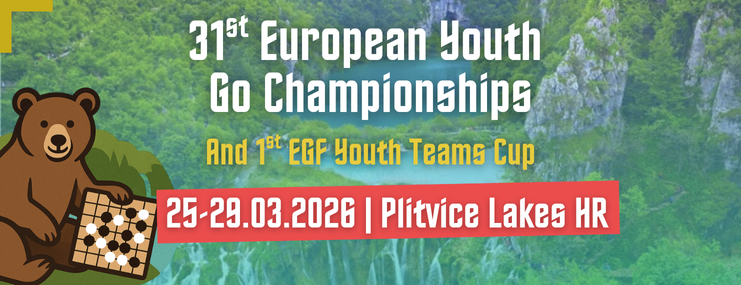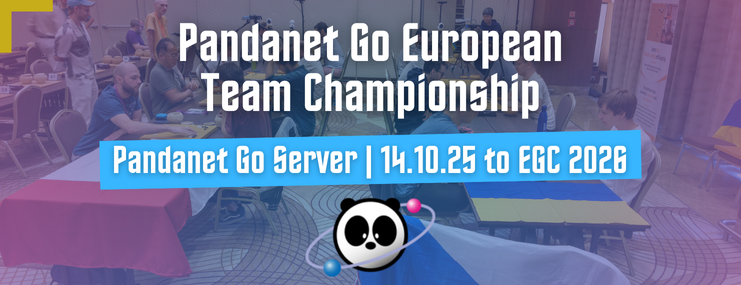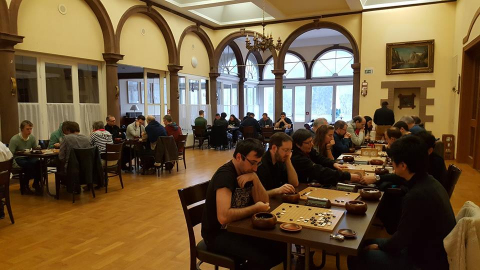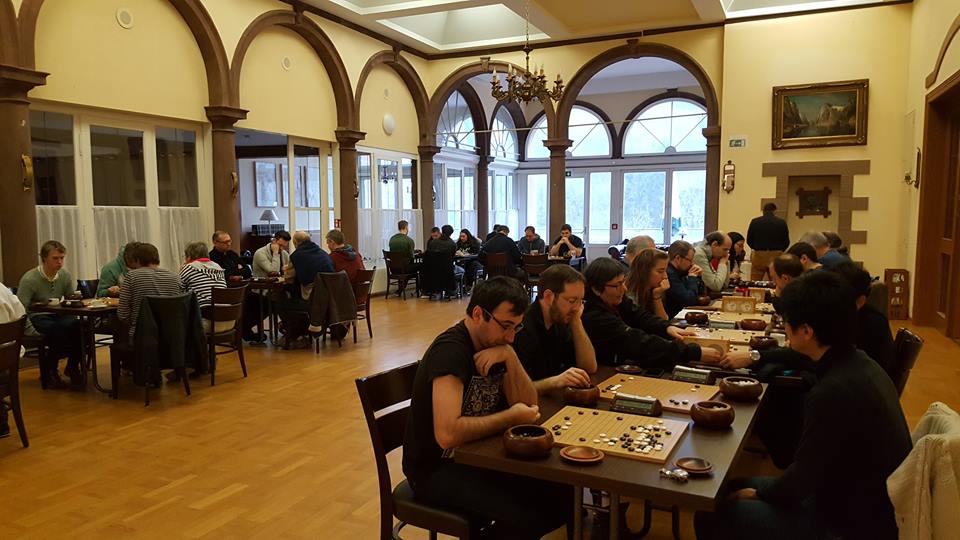 In the week before Christmas, a group of almost 40 people gathered in Kyllburg in the picturesque German Eifel, for 4 days of go-lessons and games. The organizer was Inseong Hwang, who schedules this Winter Camp every year in addition to running the Yunguseng Dojang (www.yunguseng.com), his successful internet go school.
In the week before Christmas, a group of almost 40 people gathered in Kyllburg in the picturesque German Eifel, for 4 days of go-lessons and games. The organizer was Inseong Hwang, who schedules this Winter Camp every year in addition to running the Yunguseng Dojang (www.yunguseng.com), his successful internet go school.The content of the Winter Camp is similar to one month of the online Yunguseng Dojang. Participants play five games against each other, every game is reviewed in detail by one of the teachers, and between games various topics are explained in lectures.
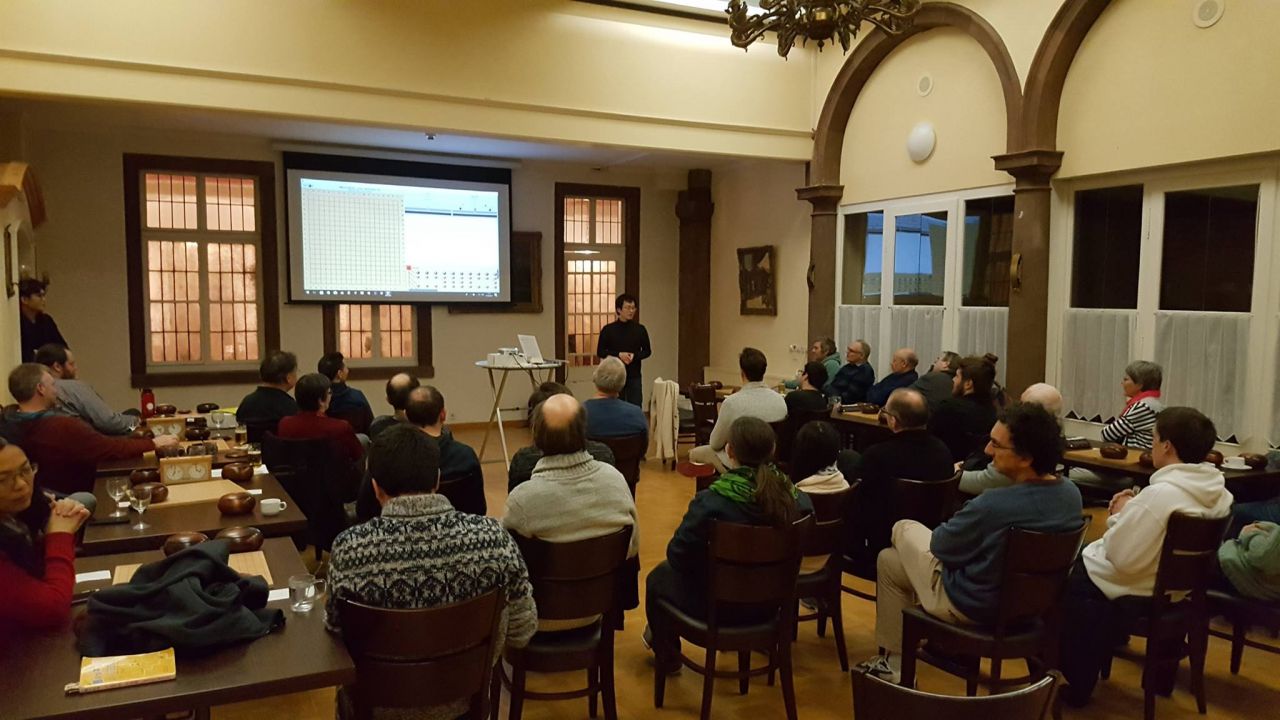
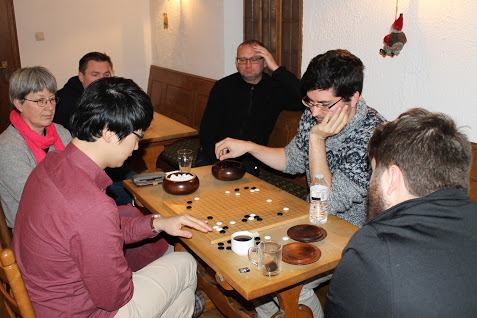
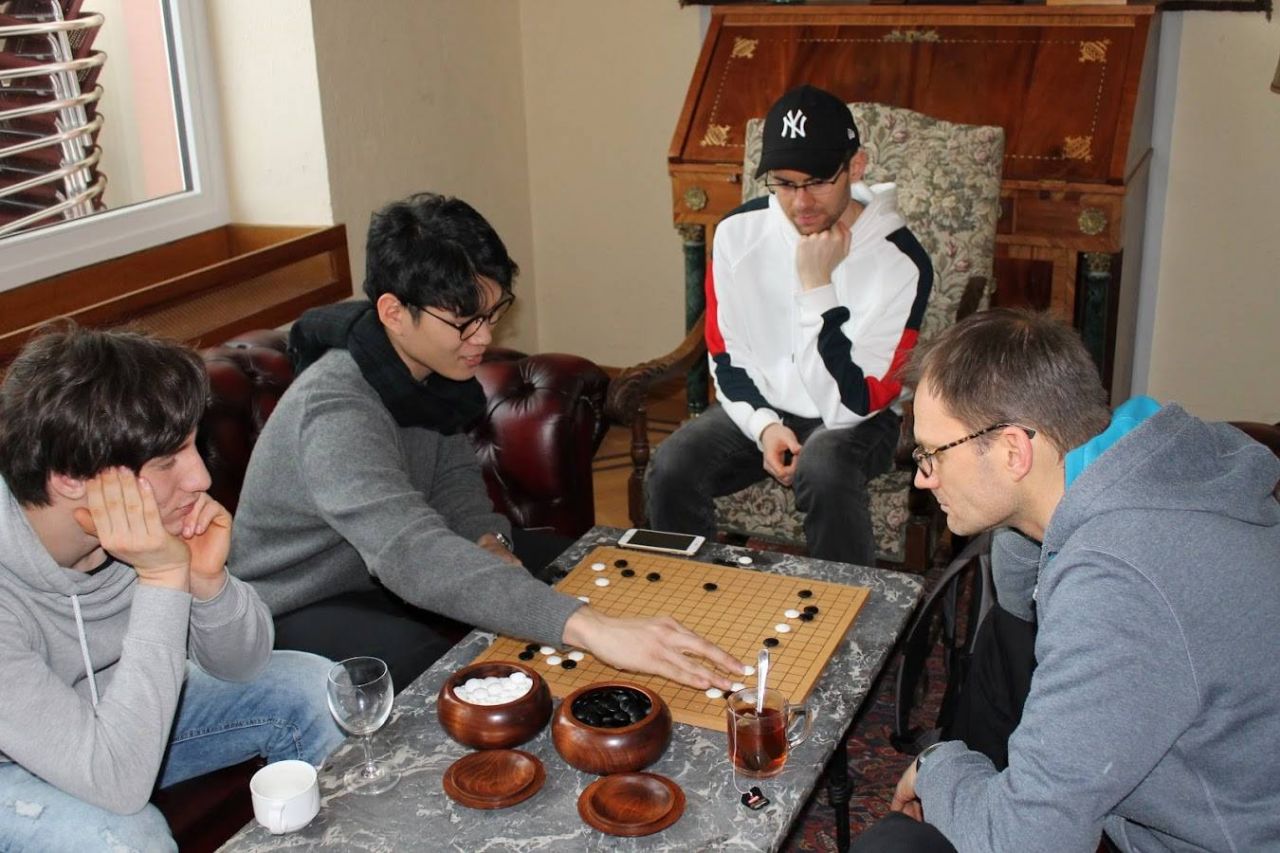


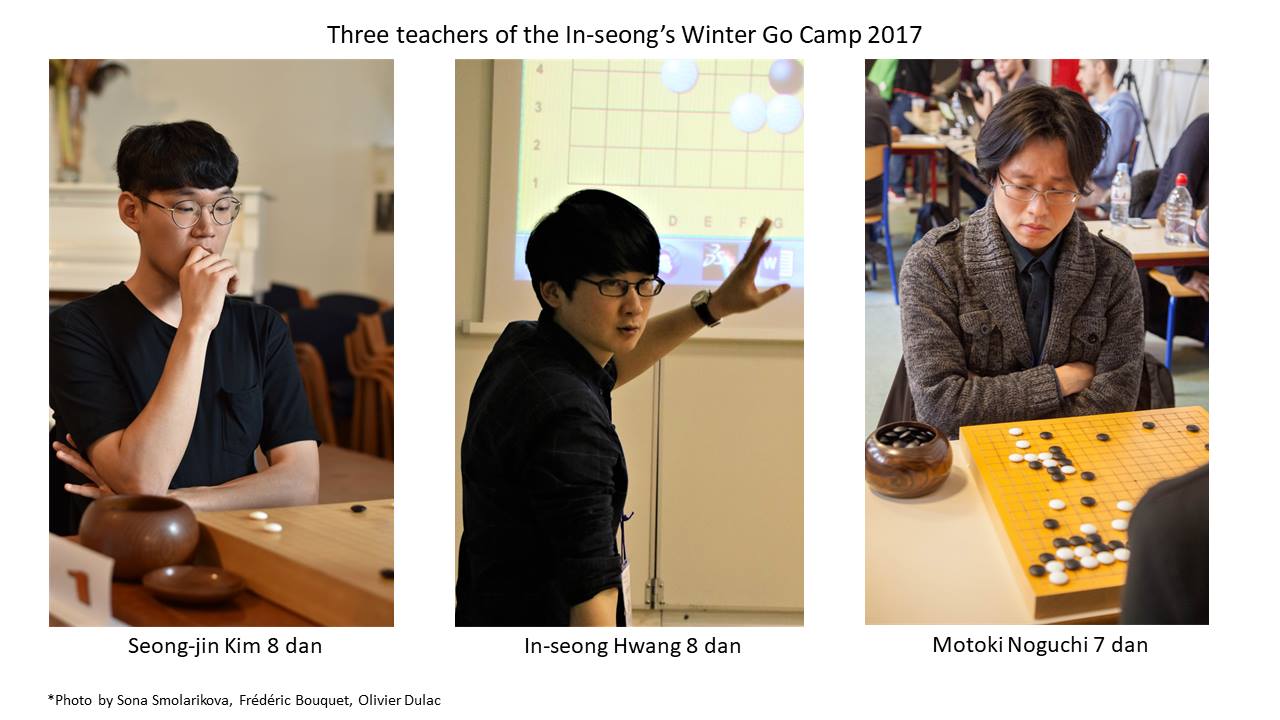 For this edition of the Winter Camp, the team of teachers consisted of Seong-jin Kim 8d from Korea, Motoki Noguchi 7d from Japan, and of course Inseong Hwang 8d. All three of them did a great job of adapting their reviews to the level of the players, which ranged from 14k to 5d. And because every player got five reviews, the teachers could also comment on recurring mistakes, or on less effective styles of play. Inseong Hwang has a special talent for finding metaphors to help understand go concepts. At the European Go Congress this summer he presented a series of lectures where he explained styles of play in terms of super hero powers, and during this Winter Camp he frequently referred back to those super powers.
For this edition of the Winter Camp, the team of teachers consisted of Seong-jin Kim 8d from Korea, Motoki Noguchi 7d from Japan, and of course Inseong Hwang 8d. All three of them did a great job of adapting their reviews to the level of the players, which ranged from 14k to 5d. And because every player got five reviews, the teachers could also comment on recurring mistakes, or on less effective styles of play. Inseong Hwang has a special talent for finding metaphors to help understand go concepts. At the European Go Congress this summer he presented a series of lectures where he explained styles of play in terms of super hero powers, and during this Winter Camp he frequently referred back to those super powers.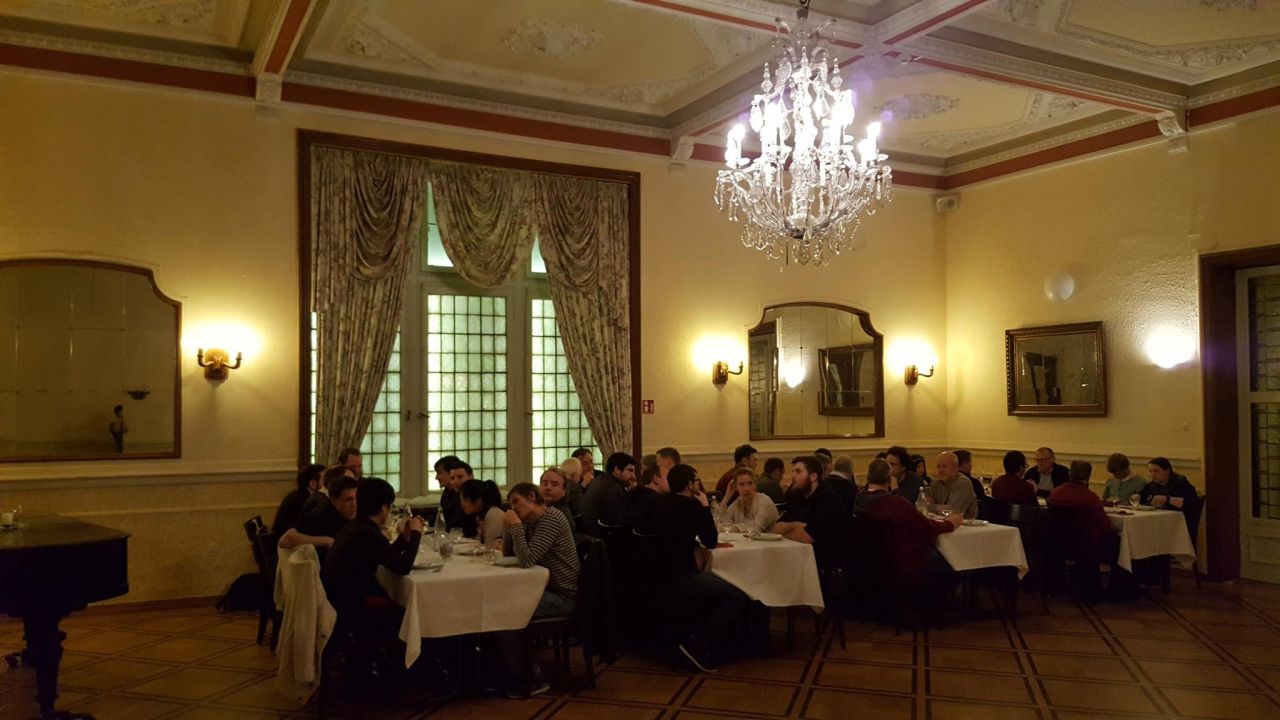


All together the Winter Camp was again an event to be recommended. Inseong Hwang announced at the Camp that in 2018 he will also organize a Spring Camp, so there will be even more opportunities in the future to enjoy his teaching in a relaxed atmosphere.
Interview of Inseong by Motoki Noguchi
Why did you come to Europe?
After my years as Yunguseng, I studied in the Myongji University and worked as a commentator on Baduk TV for more than three years. In 2005, the Berlin Go Club contacted our university to know if they could send a teacher and one of my professors asked me if I was interested : he thought of me because of my sociable character, rather rare for go players (laugh). I was about to start my military service, but since I had been eager to change my life and to discover new things, I decided to put it off and accepted this proposal.
This first year in Europe was full of plenty of surprises. During tournaments and camps in different countries, I could experience the dynamics of the European Ggo scene , in the midst of the “Hikaru no Go” fever with a lot of young players. For instance, I was quite impressed by the French go camp with its very free and festive atmosphere. At that time, I could only stay for a year and I had to go back to Korea for two years of my military service, but these experiences were rich enough to motivate me to come back to Europe. In the second year of my military service, I had much free time to think about how I could live on go in Europe. My conclusion was the following: “it is not sufficient with lessons in only one country: I must teach online to be in contact with more players.” Concerning the contents of lessons, I thought of mixing the seriousness of “Yunguseng training” and the free and enjoyable style and temper of Europe.  In 2009, chance brought me back once again to Europe, in particular into Germany, Switzerland and France, and in 2011, I was able to found the “Yunguseng Dojang”, online teaching platform, thanks to the help of several players. It originally started with 17 students; in 2014, I could open an American section; now we have 180 players joining my lessons.
In 2009, chance brought me back once again to Europe, in particular into Germany, Switzerland and France, and in 2011, I was able to found the “Yunguseng Dojang”, online teaching platform, thanks to the help of several players. It originally started with 17 students; in 2014, I could open an American section; now we have 180 players joining my lessons.
What is the secret of the success of “Yunguseng Dojang” for you?

Firstly, I owe the success to the fact that there are only a few online go schools. As for the teaching style, I don’t claim mine as the best, but perhaps my way is a bit different from traditional ones. Instead of directly giving “answers” to a question, I lay stress on giving the “thinking process to the answers” or the “formulas”. In addition, whenever I comment the student’s games, I try to give a more individual advice adapted to the style of each of the players.
When I don’t work, I try to check my own games to find the reasons for my moves, why I want to play in such a place and not in another area, etc. : then I take notes and analyze. It takes time to prepare lessons. What is really hard is to find the examples which offer the materials. In my case, since I comment almost annually 3000 games of my students, I save them in my personal data base and when I find some interesting situations, I put them in special folders.
I’m interested by online teaching tools in domains other than go and I personally check a lot of videos. I’m amazed by the quality of some of them. The go lessons must have the same level! Since our game is rather static, I try to make it “dance”. That’s why I always introduce some metaphors or images to animate my lessons.
What do you think about the current situation of go in Europe? And what do you think about European Go Scene compared to the Asian?
There must be a lot of opinions about the professional system by the European Go Federation, but I’m convinced it is the right direction. In 2005, when I came to Europe for the first time, the best European players had difficulties with fixing their goals. Compared to them, the young generation has a decent objective to become pro, which also gives them confidence. They are really blessed. Thanks to the professional system, the European go scene has a higher recognition in the international arena: European professionals are invited to an international tournament and can play against Ke Jie or Park Junghwang, as it was the case recently in the IMSA Elite Mind Games in China. To be honest, I’m so envious!
In Asia, players play first and think later, while in Europe, they need to understand before playing. That must be the main difference between them. Asians are speedier, but Europeans have the power to change things from the base with their deep reflection. In Europe, the level of players is still inferior to that of Asia, because players don’t have the occasion to play enough valuable and serious games. I hope the “Alphago generation” will change this situation with all the tools to which they have access, such as Alphago teaching tools.
What are your future projects or dreams?

I’m of course glad with the success of the Yunguseng Dojang, but the problem is it takes a great deal of time. I’d like to do also other things such as writing books or more IRL lessons like this camp that I enjoy a lot! My ultimate goal is to open a go center in Europe. And also to train teachers. The more there are European instructors, the more dynamic becomes the European go scene. Among young players, we have an increasing number of those who want to live on teaching. For them to give lessons with total confidence, they probably need to reach the level of European 5d. I’d like to help them to improve. I’m also persuaded we must change the “teaching culture”. How to make people pay more for valuable lessons, how to make players prepare more their lessons, how to enlarge the market itself… We have a lot of tasks. I’m able to teach in Europe, because the European go scene accepted me. In exchange, I’d like to make the system better. That’s my mission.






